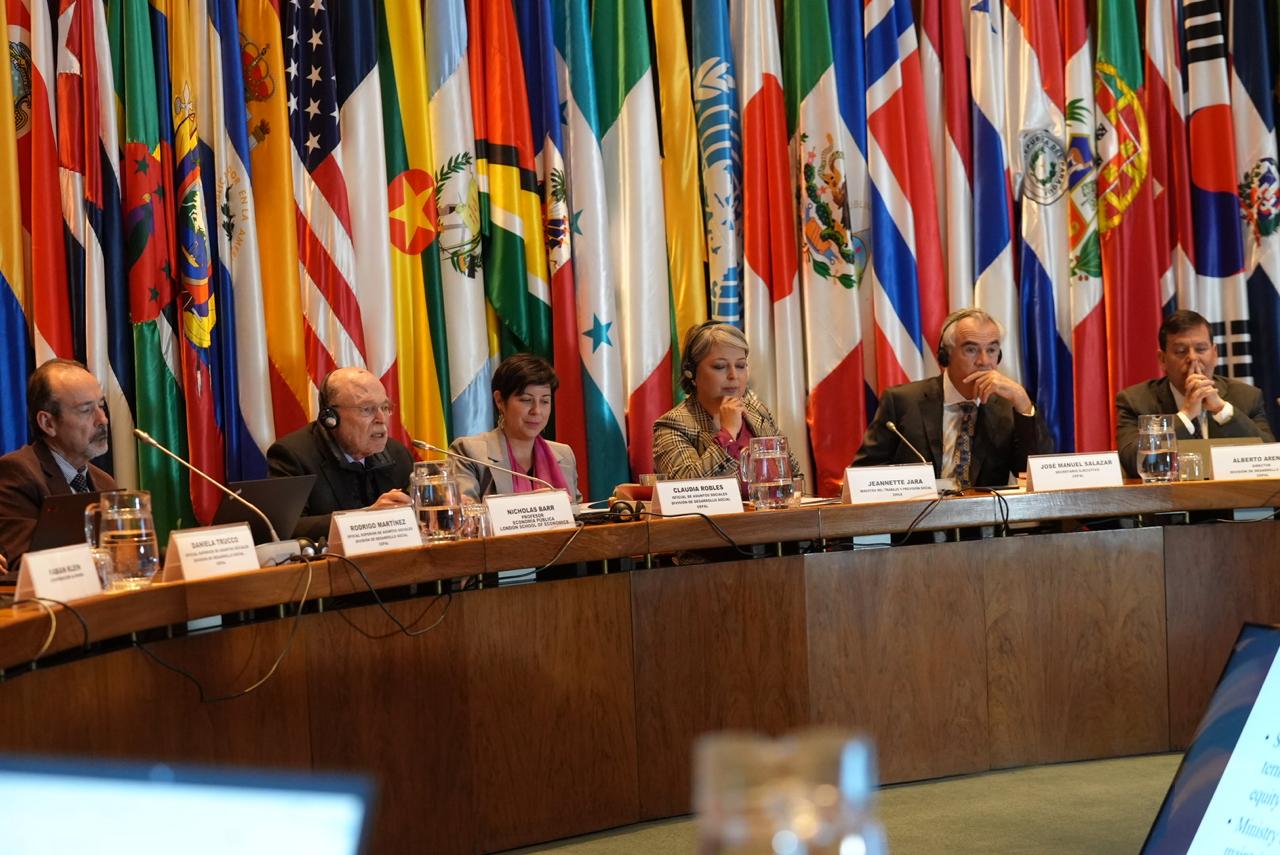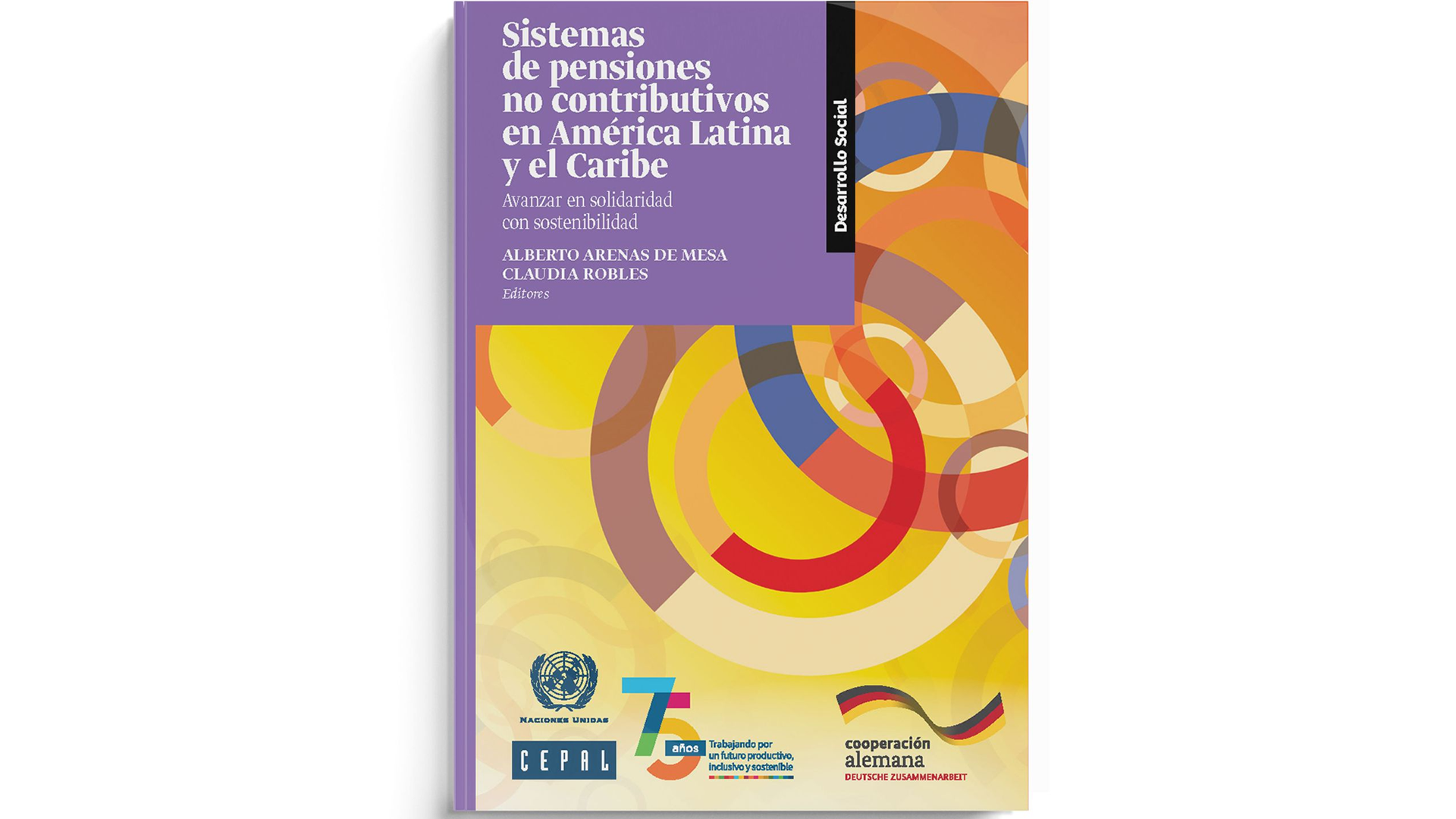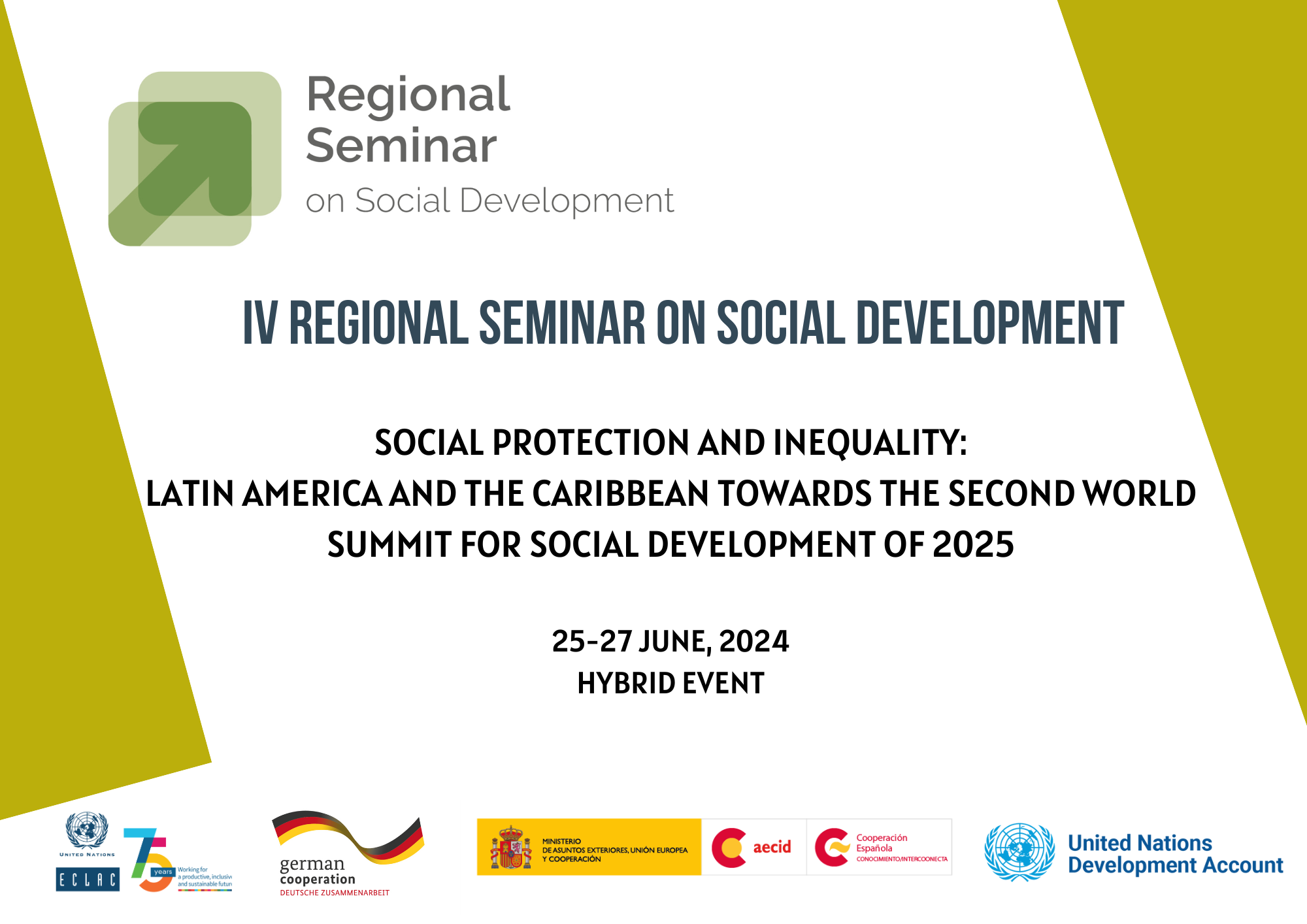ECLAC Calls for Comprehensive Policies to Address the Trap of High Inequality and Low Social Mobility in which Latin America and the Caribbean is Caught
Work area(s)
José Manuel Salazar-Xirinachs, Executive Secretary of the United Nations regional organization, led today’s inauguration of the Fourth Regional Seminar on Social Development on social protection and inequality, in which government officials and internationally renowned specialists are participating.

Latin America and the Caribbean needs to comprehensively address at least five factors underlying social inequality in the region, starting by increasing economic growth through new-generation productive development policies, the Executive Secretary of the Economic Commission for Latin America and the Caribbean (ECLAC), José Manuel Salazar-Xirinachs, sustained today at the inauguration of the Fourth Regional Seminar on Social Development “Social Protection and Inequality: Latin America and the Caribbean towards the Second World Summit for Social Development of 2025”, which is taking place through Thursday, June 27.
The event – being held at ECLAC’s main headquarters in Chile – has brought together Social Development, Social Inclusion and Labor Ministers from the region, along with other government officials and academics and specialists from countries including Argentina, Brazil, Chile, Colombia, Ecuador, Mexico, Peru and Uruguay. The programme points up thematic panels, three keynote speeches and three side events.
“As we have been saying, Latin America and the Caribbean is in a development crisis that is manifested in three traps: one involving low capacity for growth; another, high inequality and low social mobility and social cohesion; and a third involving weak institutional capacity and ineffective governance. This regional seminar seeks to delve deeper in assessments and proposals for breaking away from the core causes that determine, in particular, the trap of high inequality and low social mobility,” José Manuel Salazar-Xirinachs explained.
According to the United Nations regional organization’s highest authority, “inequality has been at the center of ECLAC’s thinking and reflections over its 75 years in existence. Inequality not only goes against basic concepts of social justice, it is inefficient for growth and corrosive to social cohesion and the stability of social compacts.”
According to ECLAC’s Executive Secretary, the five factors that the region must urgently address in order to make a real difference in terms of reducing inequality in Latin America and the Caribbean are: the productive heterogeneity that characterizes the region’s countries and does not allow for creating quality employment for the majority of the population; the persistence of regressive tax systems and social and social protection policies of limited scope; the still-insufficient coverage and low quality of education; gender inequality; and the discrimination against and violations of the human rights of indigenous, Afro-descendent and other population groups.
“Low and mediocre growth rates make it very difficult, not to say impossible, to promote productive transformation, reduce poverty, reduce informality, create high-quality jobs and generate fiscal revenue for impactful social policies. All of this points to productive development policies being part of the solution to productive heterogeneity as a cause of income inequality, policies that would invigorate growth and reduce the major differences in productivity between sectors, that would reduce productive dualism and stimulate a structural shift in production and employment towards sectors and companies with higher productivity,” José Manuel Salazar-Xirinachs stated.
The regional event also featured welcome remarks by Manfred Haebig, Principal Advisor of the ECLAC-BMZ/giz Cooperation Programme; Laura Oroz Ulibarri, Director of the Directorate of Cooperation with Latin America and the Caribbean at the Spanish Agency for International Development Cooperation (AECID); and Ximena Andión, Deputy Director at the Ford Foundation’s Mexico and Central America Office.
“I hope that this Fourth Regional Seminar on Social Development will contribute to analysis, debate and exchange so that the region’s countries can design and implement public policies to help make the triple transition, in the digital, ecological and socioeconomic realms, leaving no one behind,” Manfred Haebig said.
Laura Oroz Ulibarri underscored “the strategic partnership between AECID and ECLAC, which is already 30 years old,” and she announced that in a new phase of this collaboration, they will seek to contribute to strengthening the social institutional framework in the region in order to promote social cohesion policies centered on equality and on the effective enjoyment of rights.
Ximena Andión of the Ford Foundation also expressed appreciation for “the collaborative work we have done with ECLAC in recent years because, for us, ECLAC is an institution that has always been at the forefront of discussions on inequality,” and she agreed that this issue “runs North and South, very prominently affecting all the world’s countries, which means we must continue analyzing it from different perspectives.”
In special remarks, Paula Narváez, President of the United Nations Economic and Social Council (ECOSOC), urged for seeking convergence among the various multilateral processes underway that are focused on promoting social development in the world. “The Second World Summit for Social Development, which will be held in 2025, is an important pillar in our collective efforts to create an impetus that would accelerate progress on implementation of the 2030 Agenda for Sustainable Development,” she said.
The first day of the regional seminar also featured the presentation of the book Non-contributory pension systems in Latin America and the Caribbean: Towards solidarity with sustainability, edited by Alberto Arenas de Mesa, Director of ECLAC’s Social Development Division, and Claudia Robles, a Social Affairs Officer from the same Division, in the framework of the ECLAC-BMZ/giz project entitled “Transformative reactivation: overcoming the consequences of the COVID-19 pandemic in Latin America and the Caribbean.”
“This is the first book published by ECLAC to be exclusively focused on the study of non-contributory pension systems in the region. This is fundamental because these systems constitute a basic pillar for achieving universal, comprehensive, sustainable and resilient social protection systems. In addition, these systems are essential for achieving inclusive social development,” ECLAC’s Executive Secretary emphasized at the book launch.
According to the publication, non-contributory pension systems have experienced a truly remarkable increase in coverage. They went from covering 3.4% of the population aged 65 and over in 2000 – or just over 1 million people – to covering 31% of this population in 2022, or nearly 20 million people. In 2022, only five countries in the region lacked this type of system.
The book highlights that these systems have become a priority strategy for eradicating extreme poverty and poverty in old age. Between 2001 and 2022, poverty among people over 65 years of age was cut nearly in half, falling from 29% to 15%. In fact, there was more success in reducing poverty in old age than in reducing overall poverty, despite the population’s ageing process. Also worth noting is their contribution to reducing gender inequalities through the inclusion of older women in pension systems, among other contributions.
“The increase in the coverage of non-contributory pension systems stands in contrast to the reality of contributory pension systems, which continue to have significant deficits as a result of high levels of informality and low levels of contributions, which don’t even reach half the workforce in the region,” said José Manuel Salazar-Xirinachs, who called for building non-contributory pension systems with adequate coverage and sufficiency in terms of their benefits, and with financial sustainability.
Also participating in the book launch were Jeannette Jara, Minister of Labor and Social Security of Chile; José Carlos Cardona, Secretary of State in the Office of Social Development of Honduras; and Nicholas Barr, Professor of Public Economics at the London School of Economics and Political Science.
Minister Jeannette Jara indicated that ECLAC’s book on non-contributory pension systems is “a very good synthesis and contribution, which puts the important role of non-contributory solidarity at the center, but also makes it clear that this is not the only type of solidarity (to be expected in this area).” In addition, in the country’s effort to strengthen the pensions system as a whole, paying particular attention to informal work, the Minister announced that a bill to modify the Law of Work Accidents and Occupational Illnesses will be introduced soon, creating, among other things, a new contribution mechanism for self-employed workers.
Meanwhile, Professor Nicholas Barr sustained that the advantages of non-contributory pensions are no accident. “The design is good economics, good social policy and good politics,” he said.
Related content

“Es posible y viable erradicar la pobreza en la vejez en América Latina y el Caribe”, asegura la CEPAL
Los sistemas de pensiones no contributivos deberían estar en el centro de dicha estrategia en la región, plantea nuevo libro lanzado por el organismo regional durante el Cuarto Seminario Regional de…

ECLAC’s Fourth Regional Seminar on Social Development Will Take Place on June 25-27, Focused on Social Protection and Inequality
The event seeks to strengthen the design of public policies aimed at reducing inequality and achieving progress on inclusive social development in Latin America and the Caribbean.

Fourth Regional Seminar on Social Development "Social Protection and Inequality: Latin America and the Caribbean towards the Second World Summit for Social Development of 2025"
The objective of this seminar, organized by the Economic Commission of Latin America and the Caribbean (ECLAC) is to promote reflection and dialogue to advance in the recognition, analysis of the…
Related link(s)
Country(ies)
- Latin America and the Caribbean
Contact
Public Information Unit
- prensa@cepal.org
- (56 2) 2210 2040
